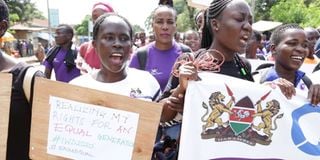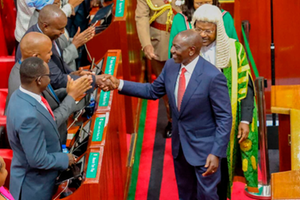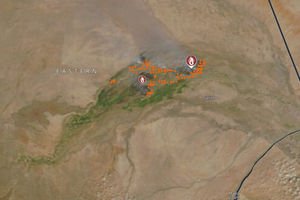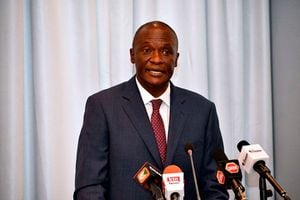Study: Kenya, India, S. Africa top the world in gender bias

Women march during a procession to mark the International Women's Day in Kisumu on March 12, 2020. The event called for enhanced gender equality.
What you need to know:
- Survey by Women Deliver show the highest rates of discrimination were are reported in Kenya at 83 per cent, India 81 per cent and South Africa 72 per cent.
- The global public perception survey includes 17 countries across six continents whose inhabitants represent half of the world's population.
- A majority of respondents want their governments to devote more resources and attention to supporting gender equality.
- Survey indicates Covid-19 has taken a disproportionate toll on women compared to men, in terms of mental health and household obligations.
More than half (57 per cent) of women report experiencing some form of gender-based discrimination in their lifetime, a new survey shows.
The highest rates of discrimination are reported in Kenya (83 per cent), India (81 per cent) and South Africa (72 per cent), according to the survey.
This means 83 per cent of female respondents indicated they have faced at least one of the forms of gender discrimination in their life.
Interestingly, 46 per cent “have not or will not receive the same inheritance as their male relatives”, 36 per cent have had their “freedom of movement restricted against their will by a family member or a partner” (54 per cent of those aged 18 to 24), and 31 per cent “did not have the same access to promotion opportunities in their job as their male peers.”
In addition, 29 per cent of female respondents reported they are “not paid as much as their male counterparts” and 17 per cent “have had difficulty accessing education and professional training”, compared with their male peers or relatives.
The global public perception survey, whose findings were released in a report by Women Deliver and Focus 2030, includes 17 countries across six continents whose inhabitants represent half of the world's population.
Gender equality issues
The respondents were asked for their opinions on six major gender equality issues, namely violence against women, women’s economic justice and rights, women's movements and leadership, sexual and reproductive health and rights, women and climate change and technology for gender equality.
“A majority of respondents want their governments to devote more resources and attention to supporting gender equality,” said Ms Catherine Fianka Bokonga, a United Nations special correspondent, during the virtual launch of the event on Thursday.
The first survey of its kind since the outbreak of Covid-19 indicates the pandemic has taken a disproportionate toll on women compared to men, in terms of both mental health and household obligations.
It offers a roadmap for actions the public wants to see, spotlighting where leaders' and decision-makers’ focus and investments can have the highest impact.
“2021 promises to be a milestone year for accelerating global progress on gender equality.
The Generation Equality Forum will call on governments, corporations, civil society and people of all ages and backgrounds around the world to step up with bold commitments to make gender equality a reality,” said United Nations Under-Secretary-General and Executive Director of UN Women Phumzile Mlambo-Ngcuka.

The Executive Director of UN Women Phumzile Mlambo-Ngcuka (pictured) says the world has affirmed that gender equality cannot wait and must be achieved in our generation.
The director added that at such a critical moment, it is invigorating to see that global public opinion is not only behind women, but pushing them to do more.
“The world is affirming that gender equality cannot wait, we can and we must achieve it in our generation, and it must be intersectional and intergenerational,” she insisted.
Kenya's worry
Kenyans indicated corruption and global diseases and pandemics are their biggest worry at the moment.
To advance gender equality in the country, 57 per cent of respondents think the government should “reform laws to promote gender equality and end discrimination against women”.
This view is held more strongly by female (62 per cent) than male (51 per cent) respondents.
They would also like the government to “focus efforts on marginalised women to leave no one behind” and “implement mass media campaigns to raise awareness on the importance of gender equality issues,” with each measure receiving 45 per cent of support from respondents.
Centre for Rights and Education Awareness Executive Director Wangechi Wachira said corruption hugely impacted access to essential services for women in Kenya.
“Kenya has laws, which is a good thing, but if the laws are not implemented, we won’t achieve anything,” she said.
On the best way to deal with gender-based violence, most respondents (78 per cent) believe the government should “end traditional practices that are harmful to women and girls (for example, child marriage and female genital mutilation)”.
There is also support for “funding programmes to support women who have experienced violence” (58 per cent) and “increasing accountability for (perpetrators of) physical and sexual crimes against women” (54 per cent).
“Funding programmes to support women who have experienced violence” is more important for female respondents (66 per cent), and in particular for those aged 45 and older (77 per cent).
Sexist joke
The report also showed 53 per cent of respondents in Kenya believe it is “acceptable” for women to always obey their partner, while 22 per cent believe it is “unacceptable”.
For 36 per cent of respondents, it is “acceptable for women to refuse sexual intercourse with their partner”, while another 36 per cent believe it is “unacceptable”.
However, the vast majority of respondents in Kenya believe that it is “unacceptable” “to whistle at a woman in the street, to touch a woman without her consent” (90 per cent) and to “tell or share a sexist joke about a woman with friends or on social media” (82 per cent). Female respondents are more likely to find whistling at women (93 per cent) and sexist jokes (89 per cent) “unacceptable”.
And 71 per cent of respondents indicated they are willing to “promote gender equality in everyday conversations and interactions”.
More female (77 per cent) than male respondents (64 per cent) supported this call.
The report also shows 64 per cent of respondents would “share information about gender equality on social media” (69 per cent of female and 60 per cent of male respondents).
The findings show 61 per cent of respondents would “volunteer with an organisation working on gender equality” (68 per cent of female and 55 per cent of male respondents) or “vote in an election for a candidate supporting gender equality”.
A majority of the respondents – 80 per cent on average across the 17 surveyed countries – said gender equality is a priority to them personally, and 65 per cent said their government should do more to promote it.
The global public supports the need for women to play a role in all aspects of the pandemic response, with 82 per cent of survey respondents on average saying they believe women should be involved in the response at all levels.
This is despite the fact that, although women make up 70 per cent of frontline workers, they currently make up only 24 per cent of Covid-19 response committees.
Women Deliver believes that to address these realities, a gender lens must be applied to Covid-19 response and recovery plans.
In 13 of the 17 countries surveyed, women aged between 18 and 44 reported experiencing more emotional stress and mental health challenges compared to men during the pandemic.
17 countries
The survey was carried out through an online poll in 17 countries conducted by the polling institute Deltapoll (Australia, Argentina, Canada, Colombia, France, Germany, Great Britain, India, Japan, Kenya, Mexico, New Zealand, China, South Africa, Switzerland, Tunisia, and the United States) in primary local languages, with 1,000 respondents in each country.
The countries account for 50 per cent of the world’s population, including 53 per cent of adult women (aged 18 and over) and 59 per cent of the world's GDP.
Nine are high-income countries, five are upper-middle-income countries, and three are lower-middle-income countries.
The raw data was weighted by gender, age and region, as well as chosen political party in the last national election.
External factors that may have affected the sampling include willingness to take part in the survey, access to the internet and
Covid-19 lockdowns
Data was gathered on race and ethnicity and the report endeavours to highlight the correlation between race and ethnicity as well as country-level survey responses.
However, a comparative analysis across 17 countries is not feasible as the race/ ethnicity categories, which are derived from national census data, vary from country to country.
Focus 2030 and Women Deliver have made the data from the survey available through Open Data and a data visualization tool. The country profiles are also available to capture public perceptions in each of the countries covered.
@LeonLidigu





